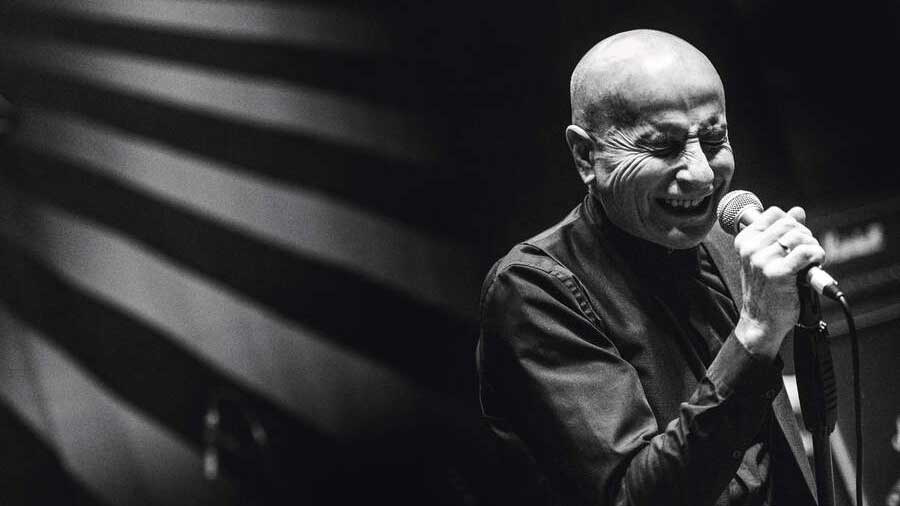
Phil Mogg is talking about the time in August 2022 when he almost died of a heart attack. “I’m good now. I think,” he says, grinning, checking his pulse theatrically. “Hold on a minute… Who paid for the last round? No… I got lucky really.”
Classic Rock is catching up with Mogg in Brighton, where the veteran singer now lives, to discuss the apparent dissolution of his much-loved band UFO, as well as the latest repackaging of the band’s sixth album, Lights Out. He also sheds light on the birth of a new solo project called Moggs Motel.
It’s mid-January, and we are among the first customers to walk through the door of a pub near the railway station. For some unexplained reason we drink halves instead of pints, forgetting that doing that usually hastens consumption. Gradually the pub’s early drinkers arrive. Those are gradually replaced by the lunchtime crowd. By the time we leave, following multiple exclamations of “Just one more?”, darkness is approaching.
On that August 2022 evening, Mogg, now 76 years old, was at home with his wife Emma, a former glamour model, when he started to feel unwell.
“I thought it was indigestion or heartburn. But it was quite a bit more than reflux. Emma was watching a comedy show, with a glass of wine, and I was going [mimes choking],” he says. “She’s laughing at the TV, and I’m realising it’s serious – ‘Hang on, I could be dying here.’ So I popped to the hospital down the road.”
The eventual outcome was that Mogg had two stents implanted into his coronary arteries, and doctors advised him to rest. That caused the cancellation of the final run of dates of UFO’s farewell tour, Last Orders, which was scheduled to finish in Athens. “It was all a bit of a shock,” he admits.
Responding to the suggestion that Mogg looks after himself better these days – certainly compared with the levels of UFO’s Bacchanalian heyday – he simply chuckles darkly. Doesn’t he go to the gym?
“Not any more. I use gardening as the gym. You can do as much or as little as you want.”
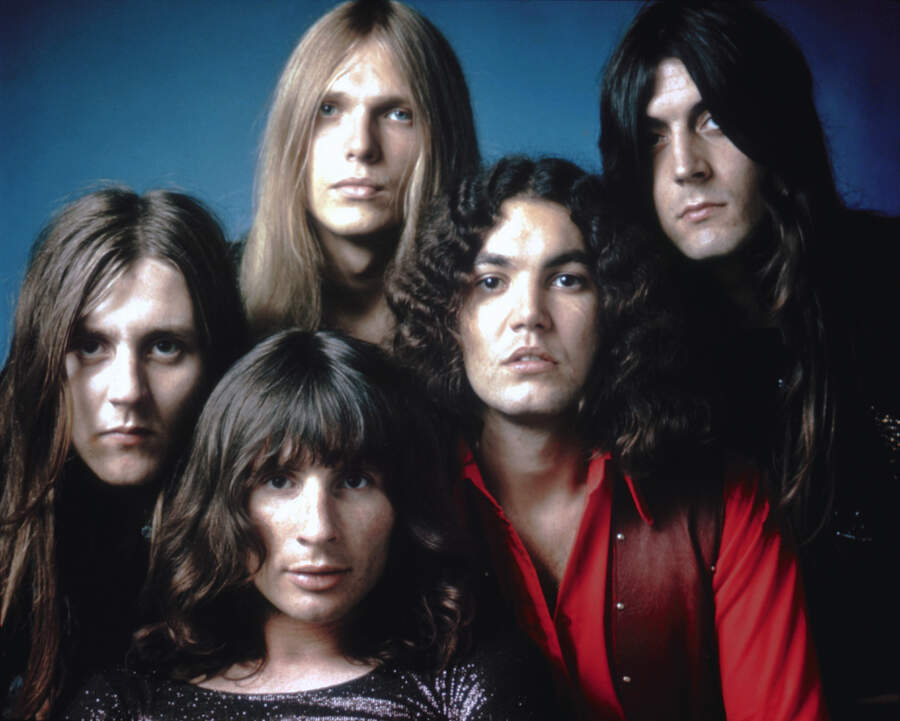
The enforced cancellation of the final run of Last Orders shows suggested the end of the long road UFO had travelled for more than 50 years, and our meeting in Brighton comes a few days after the announcement of an online auction for the equipment used by the band on their US tours.
“Basically, all of that stuff is in storage. We may as well flog it,” Mogg says.
It seems awfully final.
“Well, the situation was frustrating,” he says. “When you commit to doing something, you should finish it, but it just wasn’t possible.”
So UFO are over, definitely, for good?
“Yeah. That’s it.”
There’s no going back?
“No. That really cool tour we did in the UK was it. For us to suddenly reappear again, the fans would say: ‘Oi! I paid to see you on that last tour.’ Some might think that a great thing. Me, I don’t think so.”
UFO’s topsy-turvy career is a tale worthy of an entire issue of Classic Rock. The line-up changes, mid-tour departures, fist fights between band members, reunions, and now belatedly blighted by funerals, often marinated in strong booze and heightened by Class-A drugs. Its plot twists would merit a soap opera were they not so implausible.
Regularly in cahoots with co-founding bass player Pete Way (RIP), as the group’s singular strand of consistency Londoner Mogg was right there at the heart of it all. He’s been a singer, lyricist, ringleader, villain (during the 70s he punched the band’s talismanic guitarist Michael Schenker, causing him to quit), bandleader (for the 1985 album Misdemeanor, Mogg rebuilt UFO from scratch), and clown (he fell off stage on at least one occasion). But now, after 56 years of all that and much more, the time has come for Phil Mogg to do something else.

Before we get into that, there’s the not-so-trifling matter of the new 2024 reboot of Lights Out, remastered and with the added bonus of a fabulous archive show from London’s Roundhouse in 1977. Mogg is well aware of EMI’s efforts to overhaul the band’s catalogue.
“Those reissues are impressive, aren’t they? It makes me think why we didn’t do that [employ such a level of care] back in the day.” he says, grinning. “No, I’m joking. They’re very nice.”
Like many artists, Mogg has a complicated view of the industry’s quest to re-sell to the public records that they already own.
“The labels are always looking for something new, and I find myself wondering who’s going to buy it,” he muses. “If these things come out again on vinyl, that’s a selling point for me. From that perspective it’s a good thing.”
As a curious aside, Mogg confides that he recently bought a copy of UFO’s quintessential 1979 double live album Strangers In The Night from a second-hand record shop adjacent to the pub in which we sit. “I didn’t own an original version, so I bought one. Just to put it on the shelf, I guess, along with everything else. Everything goes into a cupboard or on to a shelf.”
As the swan song of UFO’s herculean first era with Schenker on guitar, Strangers still stands up as a brilliant record. “Yeah,” Mogg says fondly, nodding. “But I tend to remember the funny bits [more than the music]. With Lights Out, making that album was a barrelful of laughs. It was a good, fun time, everybody was enjoying themselves and stuff.”
Including the supposedly ‘difficult’ Michael Schenker?
“Yeah. He had his moments. You had to look out for them. No… I’m kidding. Michael was fine.”
For UFO, Lights Out and its follow-up Obsession were the best of times. With Schenker on board, having joined from the Scorpions in 1973, the band had toured heavily for Force It and No Heavy Pettin’, released in 1975 and ’76 respectively.
“We also knew that either Lights Out was going to do something big for us, or it wouldn’t,” Mogg recalls. “No disrespect to Leo [Lyons, the former Ten Years After bass player who produced those two records], but we had to jump from where we were to somewhere else. That’s when some investigation began – which producer had made the albums that we liked best. And Ron Nevison’s name kept coming up.”
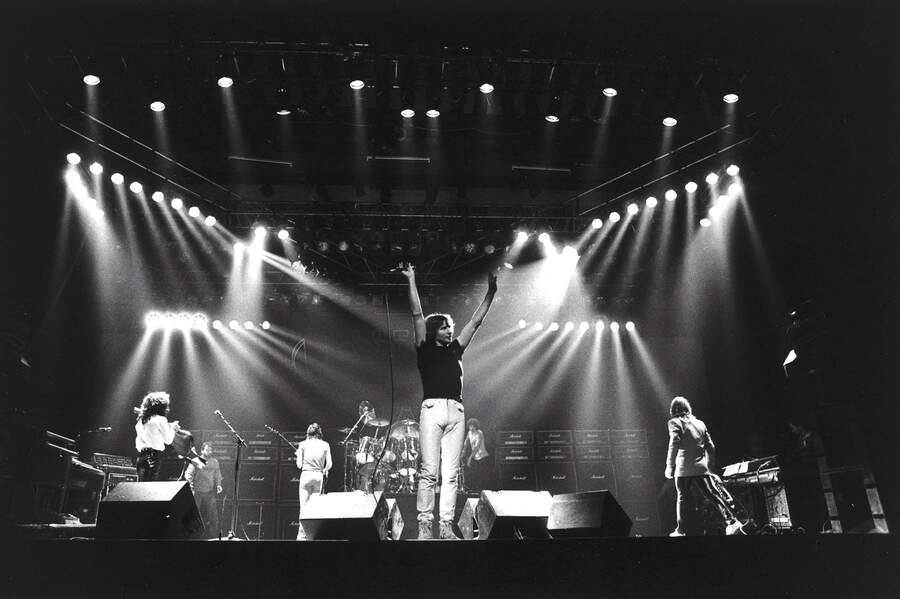
With Nevison signed up as producer, UFO and their new keyboard player/second guitarist Paul Raymond set up in Air Studios at London’s Oxford Circus. Having worked with The Who and Led Zeppelin, Nevison was a hard taskmaster. A real man’s man. And he liked to let his charges know who was boss.
“Only if you took any notice of him,” Mogg says. “I’m sure that to most people Ron could be quite intimidating, but we had this way of subtly… sort of not letting him do that. He was right and he was the producer, but he had a knack of putting things that might rub people up the wrong way. Fortunately we all became pals. Ron made the band sound amazing. He gave us that extra push."
Lights Out was packaged in an eye-catching sleeve, shot in the bowels of London’s Battersea Power Station and created by the immensely popular and acclaimed design team Hipgnosis.
“Who knows what was going on there,” Mogg ponders, with a wave of his hand. “The idea came from them, Storm [Thorgerson] and Po [Powell]. I’m not sure if they had taken a load of pictures of inside Battersea when they worked with Pink Floyd. You know, Battersea Power Station… lights… that was the connection. We lucked out working with them.”
Lights Out became and remains UFO’s highest-charting album in the USA, but Mogg rejects the suggestion that the band felt tantalisingly close to becoming The Next Big Thing.
“We didn’t buy into such preconceived ideas,” he insists. “We were still too busy telling ourselves: ‘All of this is a bit good, isn’t it?’”
Retaining Nevison, UFO went to California to make Obsession, where their great adventure continued, residing in hired luxury pads and driving rented cars.
“You don’t own them,” Mogg says, smiling, “and years later you discover that you still owe money on them. It’s a funny old world. But yeah, we enjoyed the experience to the maximum. We certainly paid for it to the maximum.”
He chuckles when he recalls the group’s respective choices of mode of transport.
“I went for the Trans Am with the eagle on the front – I took that off, I couldn’t stand it. Michael got a Chevvy Stringray, and Pete went for the Camaro. Paul took over [Chrysalis labelmate] Robin Trower’s Cadillac. For some reason Andy [Parker, drums] picked a Honda Civic. That still makes me laugh.” On one notable occasion the band raced through Coldwater Canyon, although Mogg claims they “remained just within the speed limit”.
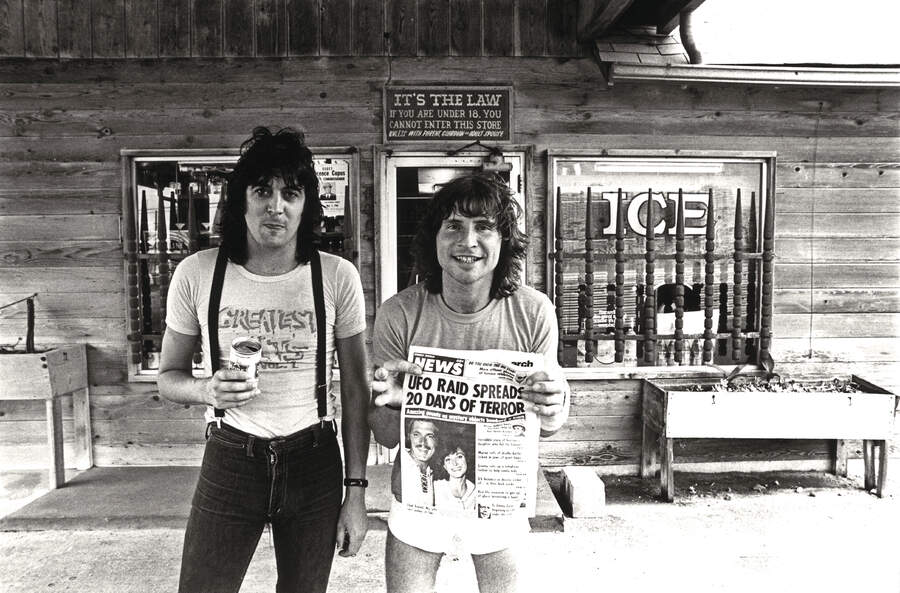
From the outside it looked as though UFO were English (and German) rock stars living the Californian dream.
“Not really,” says Mogg. “We were working in LA, but it really didn’t feel romantic in the sense you are implying.”
All the same, by that point UFO had put in more than a decade of hard work and knew they were making great records. “The thought never occurred to us,” he says. “Honestly, it wasn’t like that. That’s not the kind of people we are. You’d be somewhere on the road in America, a bit knackered from partying and in one of the most awful places, and before going on stage Pete would gather us together and in very serious tones tell us: ‘Right, we’re about to take out Poughkeepsie.’ It was absurd, but that was our general attitude.”
There was also an awareness that it could all come tumbling down at any given moment.
“As much as we were enjoying it to the max, nobody expected things to last,” Mogg affirms. “There was a bit of friction with Michael, because Way and I were just juveniles. And of course, Parker was the sensible one.”
Were those times the best of his life?
“Yeah, probably. It was pretty knockout.”
Following the departure of Michael Schenker at the end of the 70s, UFO invited former Lone Star guitarist Paul Chapman back for a second run with the band. The Welshman had played with UFO from 1974-75 as part of a twin-guitar line-up alongside Schenker. With Chapman, nicknamed ‘Tonka’ for his indestructible qualities, UFO thrived, although a softening of their sound caused Way to quit following 1982’s Mechanix. The rest of the decade presented tough times and mixed results, and a number of line-up changes.
In 1991, Mogg and Way put the band back together without Schenker, although along with Raymond and Parker he rejoined for Walk On Water, an excellent album, again produced by Nevison, from a frustratingly short-lived reunion.
Schenker rejoined again at the turn of the millennium. But following his shamefully inebriated performance at Manchester Apollo, UFO’s fortunes plummeted to an all-time low. Still, Schenker’s replacement, American guitar hero Vinnie Moore, remained a part of UFO until the very end, and from 2004’s You Are Here onwards they made a string of very creditable records. Sixteen years ago, Way’s own well-publicised issues with addiction gave the band no option but to ‘let him go’. He never returned to the line-up. To Mogg’s great sadness, Way died in 2020.
It’s fair to say that, robbed of the bonhomie of his long-time partner in crime, life within UFO was never the same again for the singer. He enjoyed the 100 minutes or so performing on stage each night, but the travelling wore him down. As a man of advancing age, the more undignified elements of the rock’n’roll circus became magnified.
With bandmates past and present now passing on, Mogg became conscious of his own mortality. In 2018, during the build-up to UFO’s 50th anniversary, he announced his retirement from the road upon completion of a tour that, inevitably, became significantly extended. “This is the right time for me to quit,” he said back then.
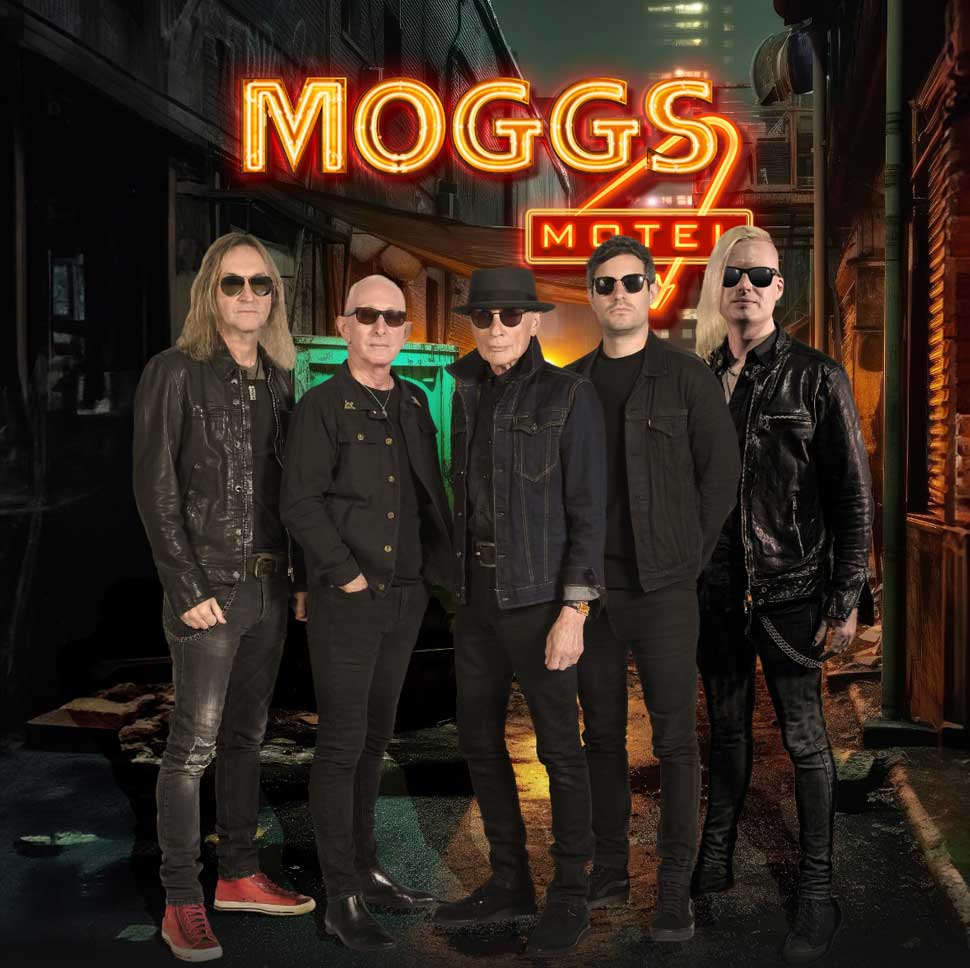
Mogg had ventured outside of UFO for two albums with Way under the handle Mogg/Way, and even undertook a short tour for an extremely fine 2002 project named $ign Of 4. With that in mind, the end of UFO wouldn’t necessarily spell the end of his career as a musician. A fresh period of activity began when Mogg bumped into Tony Newton, the bassist with Voodoo Six, and now a member of KK’s Priest.
“We [UFO] had toured with Voodoo Six so we got chatting,” Mogg recalls. “I told him I was looking to do something, and he replied – this is great: ‘Well I’ve got a couple of riffs.’ So we got together to see what transpired. And then Steve [Harris, Iron Maiden bassist] lent us his studio.”
Over the following year, and partly during lockdown, the project took shape. Just like the album, the band are called Moggs Motel (no apostrophe). “Motels don’t have apostrophes,” he insists. “Not the ones I stay in, anyway.”
Besides him and Newton, who also co-wrote and produced the album, the line-up includes Neil Carter, UFO’s second guitarist, keyboard player and occasional saxophonist, who returned to the group unexpectedly following Paul Raymond’s death in 2019, plus second guitarist Tommy Gentry (Gun, The Raven Age) and former Voodoo Six drummer Joe Lazarus.
Inserting Moggs Motel into a one-size-fits-all category isn’t easy. On the day that we meet in Brighton, Mogg doesn’t even try.
“I’ve played the album to a couple of people I know,” he confides, before listing several of them, including his daughter and “my mate who lives around the corner” who considered it “lovely”. Ultimately, he shrugs: “I don’t know what to say.”
But it’s rock music?
“Well, it’s kind of symphonic rock. No. Actually, I don’t know what it is.”
He whips out his mobile phone and plays a couple of tracks. Sunny Side Of Heaven features Alabama 3 singer Zoe Devlin Love, while the instrumental Harry’s Place is a flute-driven nod to the Dirty Harry soundtrack. Mogg hopes to play a one-off showcase-style gig for the album in the not-too-distant future.
“It’s being discussed, it’s just a case of finding the right venue,” he says. “I’ve even got a new hat.”
Moggs Motel is a great name for a band. Some guests check in and some leave. Other, less savoury, characters are barred.
“My motel has speciality suites,” he remarks proudly. “The Frank Sinatra Suite has been left reserved. I’ve given Kate [UFO’s long-suffering merchandise and web lady] the Sammy Davis Jr. Suite. There are also the Dean Martin and Lauren Bacall Suites. I’m thinking about a Charles Bukowski Suite. You can have that one, because it’s for writers.”
Thanks. On that note, another half?
“Yeah, why not.”
In the summer of 2019, with no British dates on the cards for the line-up featuring Neil Carter, Mogg invited me to attend a couple of UFO shows on the continent. Travelling on the bus, he often sat up front in the dark, watching quietly as the miles were eaten up.
“I call it, white-line fever,” he says. “I love midnight driving, just the driver and you. I like to play Tangerine Dream, Love On A Real Train. Try it, it’s great.”
Will all of that be hard to relinquish?
“Not really. I said that when I stopped having fun I wouldn’t do it any more. I hadn’t reached that point, but… I don’t know how to explain this… Well I do, but I’m not going to. UFO was wound down at the right time. I’d had a birthday, the band had had a good run, it was time to go: ‘Well, this is it.’ Plus I fancied doing something else anyway.”
All the same, the other members of UFO, especially Andy Parker, felt that there was still mileage in the UFO name. Could the band still make records, without touring?
“No,” he fires back instantly. “And there are deep rooted reasons. But… definitely not.”
UFO’s career has been fascinating in so many ways. If Mogg could go back and change some of the many ‘banana-skin’ moments’, would he do so, and what would they be?
“When all those glamour models were banging at my door, I should have opened it and let them all in,” he deadpans. “But I was strong, I said no.”
Is there a serious answer for that question?
“No. Some things get screwed up and others are great. That’s life. But I do wish we’d got a fair crack of the whip.”
Business-wise, you mean?
“In our youth we were gung-ho, living in the moment. If only someone had looked after us. But those people are hard to find. As far as UFO goes, we got pretty screwed.”
UFO have been hailed an as influence by Metallica, Guns N’ Roses, Iron Maiden, Judas Priest, Pearl Jam and Alice In Chains, but Mogg states: “I take all of that stuff with a pinch of salt. Steve [Harris], for instance, says nice things about us. [Pearl Jam guitarist] Mike McCready wrote a charming note after we covered [McCready’s 90s project] Mad Season’s River Of Deceit. You half-believe it, don’t you? But I always mistrust someone that says: ‘You’re fucking great’.”
Former band members and associates, including ex-manager John Knowles and popular tour manager Tonio Neuhaus, are no longer with us, but they are never far from Mogg’s thoughts. “There’ll be a question to ask Pete, and then I realise he’s not there to answer any more,” he sighs.
During the later years, you and Pete remained extremely close.
“We had some fucking great times. I mean ridiculous times,” Mogg reminisces. “Those two [Way and Chapman] always made me laugh. [Mogg launches into a scarily good impression of Way]: “Here, John, is there any more money left in the float?” [Then just as accurately as Chapman]: ‘Eh, I tell you what, let’s get drunk like we used to.’”
With impeccable comic timing, Mogg says: “That bastard [Way] still owes me twenty quid.”
So, if UFO are over and done, how would Mogg like his band to be remembered? “I’m happy that we achieved what we set out to do, and I hope people think of us in the way I remember The Animals, who I saw as a kid and it gave me goosebumps,” he concludes. “I know we did some dodgy gigs when we overindulged, but the good ones really took off. So if we gave some people goosebumps, for me that would be sufficient.”
Moggs Motel is available now via SPV.







